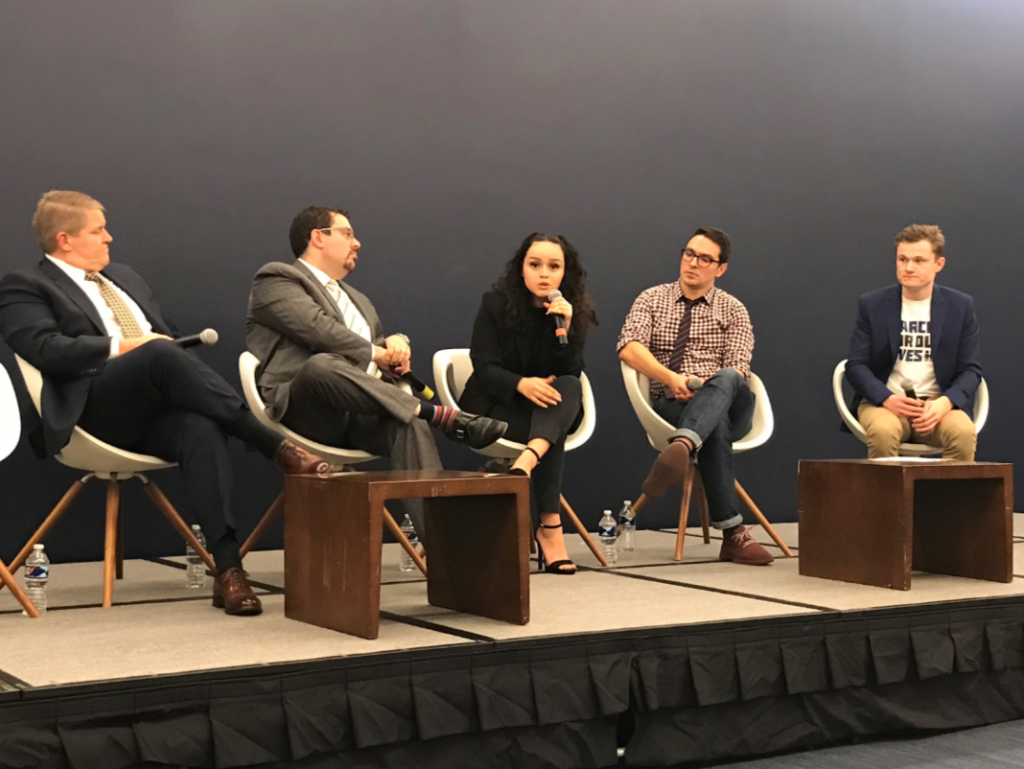“This is not a Republican issue. This is not a Democratic issue. This is an American issue,” said Dr. Joseph Sakran, director of emergency general surgery at Johns Hopkins Hospital at the March for our Lives event on Monday.
As both a doctor and a gunshot wound victim, Sakran has seen firsthand the impact of gun violence in the U.S., calling it “a public health crisis that we are facing on a daily basis.”
Sakran and others involved in national gun violence prevention shared their thoughts and experiences as part of a paneled discussion, “Only In America: Examining the Everyday Toll of Gun Violence.” The event was hosted by March For Our Lives Georgetown (MFOLGU) in conjunction with Georgetown University College Democrats, Georgetown University Lecture Fund, the Institute of Politics and Public Service, and Georgetown University American Civil Liberties Union.
Sakran was joined by Igor Volsky, author of Guns Down: How to Defeat the NRA and Build a Safer Future with Fewer Guns, Helisa Cruz, state director of March for our Lives D.C. (MFOLDC), and David Chipman, senior policy advisor at the Giffords Law Center and former Alcohol Tobacco Firearms (ATF) agent in the discussion, which was moderated by MFOLGU Political Affairs Director Stefan Sujansky (SFS ’22).
Opening remarks were delivered by Sen. Chris Murphy (D-CT) and D.C. Mayor Muriel Bowser, both national leading voices for gun control legislation and gun violence prevention.
Murphy cited the 2018 midterm elections as proof of the strides the gun control movement has made nationally.
“In 2018, because we had more activists on the ground, because we had more resources, because we had more voters that cared about our issues, we took out 26 incumbents who were A-rated by the NRA in House districts all across the country and replaced them with new members of Congress who vote for things like universal background checks,” Murphy said.
Bowser, too, stressed the importance of further federal gun control legislation, claiming that the District’s “strict laws don’t work in isolation” and explained that many of the illegal guns confiscated in D.C. were trafficked from neighboring states like Maryland and Virginia.
“And that is why we have been so strong about arguing for federal changes,” Bowser said. “No city or state can solve the problem on its own.”
Despite their different backgrounds, each panelist has grappled with the issue of gun violence and seen its effects from different perspectives.
Cruz got involved in MFOLDC because gun violence has directly affected her neighborhood of Brookland. “I realized that it’s not going to be a surprise, and it’s not impossible, for one of my cousins to die of gun violence,” she said. “It’s scary to me because it’s not promised that black and brown children will live to see 20 years old.”
Sarkan also stressed the disproportionate effect gun violence has on communities of color, something he’s observed throughout his tenure at Johns Hopkins Hospital. “There are brown and black men that are being slaughtered in our streets in cities like Baltimore, Philadelphia, Chicago, and those stories often go untold,” Sarkan said.
From his experience as an ATF agent, Chipman stated that he believes gun violence in the U.S. was no accident, a reason he cited for leaving his previous job to instead work at the Giffords Law Center.
“I came to the realization that gun violence was happening by design, that people profited by this reality,” Chipman said. “People who sold guns, people who wanted to sell guns for self defense wanted a scary nation so that people would want to buy guns.”
Volsky, who had been involved in progressive politics for more than a decade, explained that he only began working with gun policy in the wake of the 2012 Sandy Hook Elementary School shooting and that up until very recently, most politicians never seriously engaged with gun policy. “For a long time, politicians from both sides of the aisle, but certainly from the left, felt that talking about guns was a big liability,” Volsky said.
However, Volsky noted, the dialogue surrounding gun policy has changed dramatically in recent years.

Panelists discuss gun violence. Photo credits: Jason Cuomo
“Now we’re talking about gun licensing, registration, buybacks, investing in community violence prevention programs, investing in research,” Volsky said. “What’s happened since is really a growing realization from politicians that young people like you care about this issue and that will you vote based on this issue.”
However, as Chipman noted, unregistered “ghost guns” made in the home with parts ordered online pose a new and unique threat to gun violence prevention, explaining how “you can buy a kit with the drill and everything to build a gun and market it as ‘Build Your Own Gun in Fifteen Minutes’ and the government won’t even know.”
The discussion concluded with a question on the indirect, systemic effects gun violence can have on a community. This question was especially personal for Cruz, who recounted throughout the night the devastating effects gun violence has had on her community and communities like hers.
“When I go home, or mostly where my friends are, this is an everyday thing,” Cruz said.
Cruz also highlighted the tensions that exist between law enforcement and communities disproportionately affected by gun violence, criticizing Mayor Bowser’s stance on policing.
“I’m pretty sure Mayor Bowser didn’t talk about this, because she also supports things that will overpolice communities,” Cruz said. “We’re not going to want to call the police. If we know that the police show, somebody’s going to be beaten, and somebody’s going to die, or somebody’s going to go to jail.”







